Event Management Analysis: 2014 Sochi Winter Olympics Case Study
VerifiedAdded on 2020/03/23
|11
|2059
|123
Case Study
AI Summary
This case study examines the event management of the 2014 Sochi Winter Olympics, focusing on the application of the Event Life Cycle Model. The analysis covers the planning, execution, and closing phases, including cost management, marketing strategies, construction, security, and media involvement. The document highlights key aspects such as the bidding process, the formation of the Sochi Olympic Park, marketing efforts like the logo and mascots, and the execution of ceremonies. It also addresses the involvement of various stakeholders and the importance of effective communication. The conclusion provides recommendations for future event managers, emphasizing cost-effective planning, infrastructure development, security, and stakeholder management, offering valuable insights for personal and professional development in the field of event management. This analysis is a valuable resource for students studying event management, offering practical examples and strategic insights.
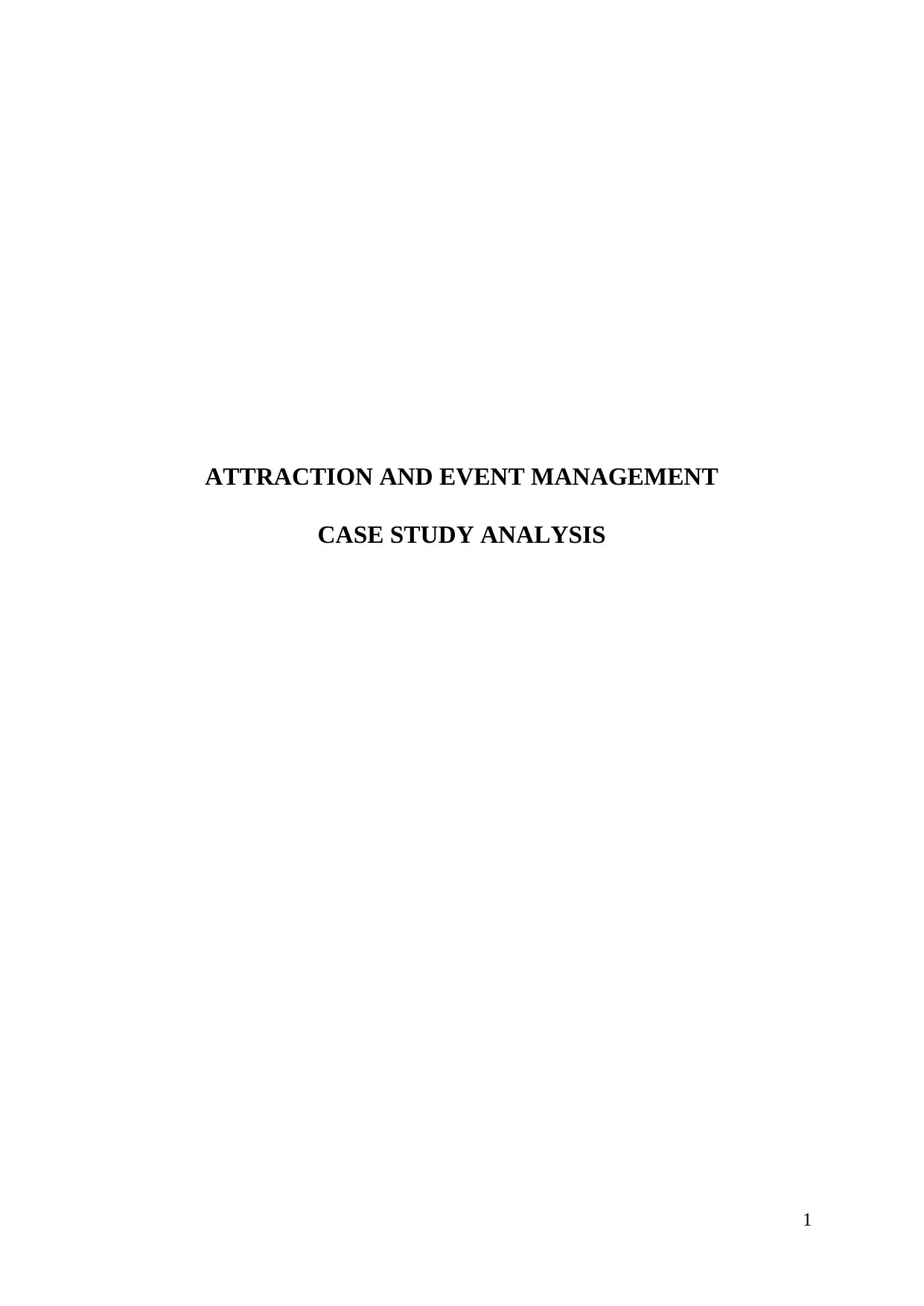
ATTRACTION AND EVENT MANAGEMENT
CASE STUDY ANALYSIS
1
CASE STUDY ANALYSIS
1
Paraphrase This Document
Need a fresh take? Get an instant paraphrase of this document with our AI Paraphraser

Table of Contents
2014 Winter Olympics:..............................................................................................................3
Event Management:...................................................................................................................3
Event Life Cycle Model:............................................................................................................4
The analysis of Event Life Cycle Stages:..................................................................................5
Conclusion & Recommendations:..............................................................................................8
Reference Lists:..........................................................................................................................9
2
2014 Winter Olympics:..............................................................................................................3
Event Management:...................................................................................................................3
Event Life Cycle Model:............................................................................................................4
The analysis of Event Life Cycle Stages:..................................................................................5
Conclusion & Recommendations:..............................................................................................8
Reference Lists:..........................................................................................................................9
2
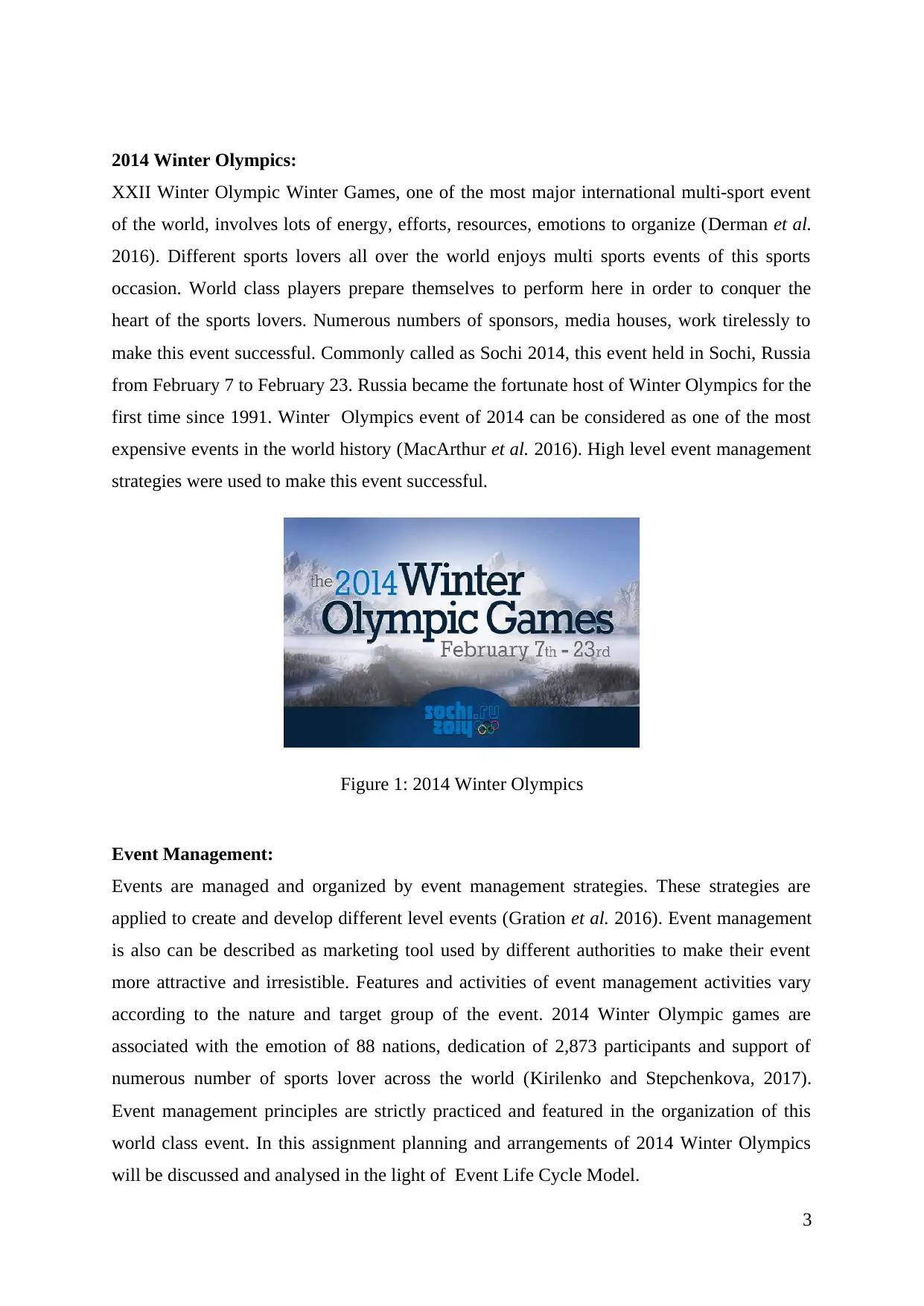
2014 Winter Olympics:
XXII Winter Olympic Winter Games, one of the most major international multi-sport event
of the world, involves lots of energy, efforts, resources, emotions to organize (Derman et al.
2016). Different sports lovers all over the world enjoys multi sports events of this sports
occasion. World class players prepare themselves to perform here in order to conquer the
heart of the sports lovers. Numerous numbers of sponsors, media houses, work tirelessly to
make this event successful. Commonly called as Sochi 2014, this event held in Sochi, Russia
from February 7 to February 23. Russia became the fortunate host of Winter Olympics for the
first time since 1991. Winter Olympics event of 2014 can be considered as one of the most
expensive events in the world history (MacArthur et al. 2016). High level event management
strategies were used to make this event successful.
Figure 1: 2014 Winter Olympics
Event Management:
Events are managed and organized by event management strategies. These strategies are
applied to create and develop different level events (Gration et al. 2016). Event management
is also can be described as marketing tool used by different authorities to make their event
more attractive and irresistible. Features and activities of event management activities vary
according to the nature and target group of the event. 2014 Winter Olympic games are
associated with the emotion of 88 nations, dedication of 2,873 participants and support of
numerous number of sports lover across the world (Kirilenko and Stepchenkova, 2017).
Event management principles are strictly practiced and featured in the organization of this
world class event. In this assignment planning and arrangements of 2014 Winter Olympics
will be discussed and analysed in the light of Event Life Cycle Model.
3
XXII Winter Olympic Winter Games, one of the most major international multi-sport event
of the world, involves lots of energy, efforts, resources, emotions to organize (Derman et al.
2016). Different sports lovers all over the world enjoys multi sports events of this sports
occasion. World class players prepare themselves to perform here in order to conquer the
heart of the sports lovers. Numerous numbers of sponsors, media houses, work tirelessly to
make this event successful. Commonly called as Sochi 2014, this event held in Sochi, Russia
from February 7 to February 23. Russia became the fortunate host of Winter Olympics for the
first time since 1991. Winter Olympics event of 2014 can be considered as one of the most
expensive events in the world history (MacArthur et al. 2016). High level event management
strategies were used to make this event successful.
Figure 1: 2014 Winter Olympics
Event Management:
Events are managed and organized by event management strategies. These strategies are
applied to create and develop different level events (Gration et al. 2016). Event management
is also can be described as marketing tool used by different authorities to make their event
more attractive and irresistible. Features and activities of event management activities vary
according to the nature and target group of the event. 2014 Winter Olympic games are
associated with the emotion of 88 nations, dedication of 2,873 participants and support of
numerous number of sports lover across the world (Kirilenko and Stepchenkova, 2017).
Event management principles are strictly practiced and featured in the organization of this
world class event. In this assignment planning and arrangements of 2014 Winter Olympics
will be discussed and analysed in the light of Event Life Cycle Model.
3
⊘ This is a preview!⊘
Do you want full access?
Subscribe today to unlock all pages.

Trusted by 1+ million students worldwide
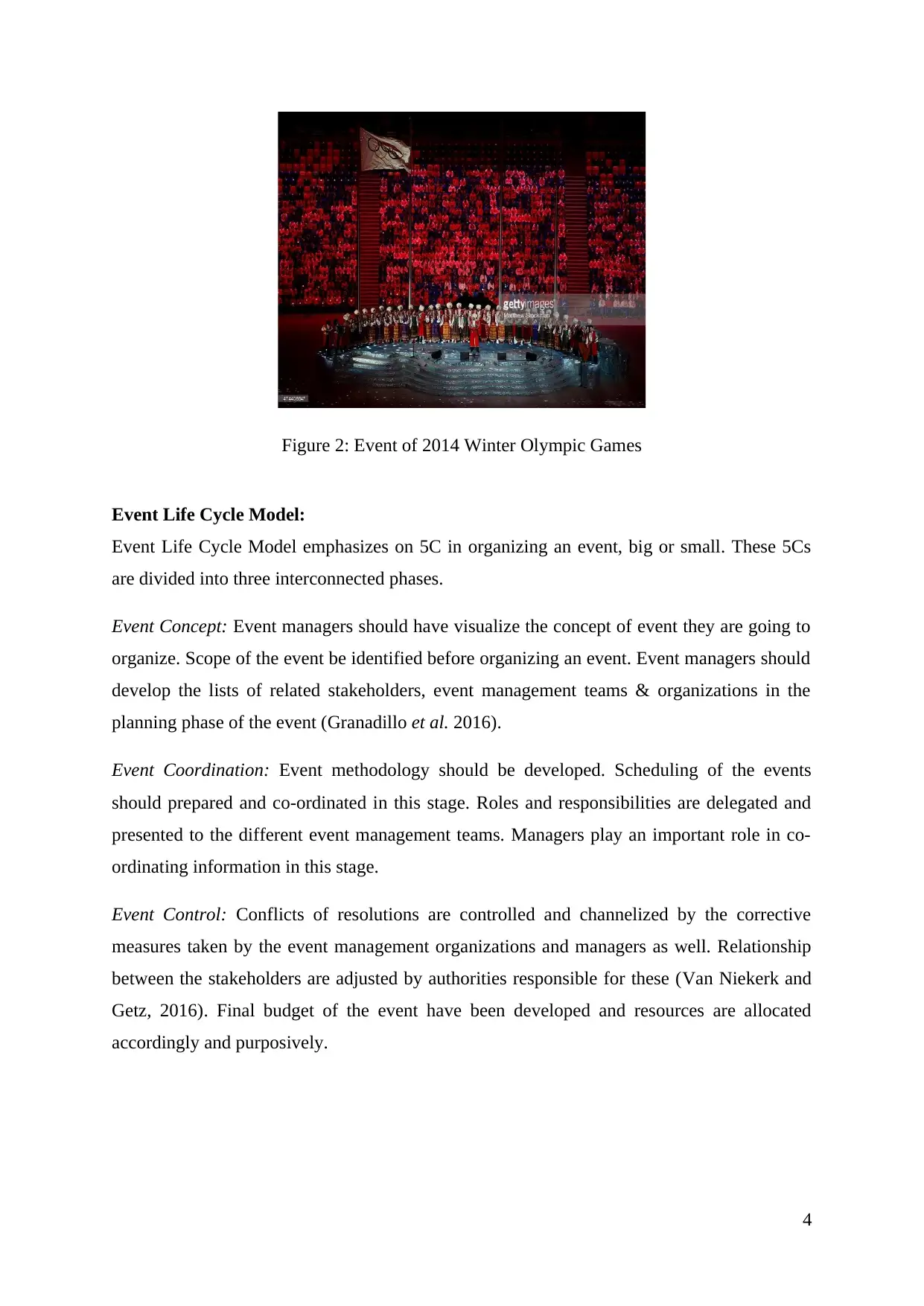
Figure 2: Event of 2014 Winter Olympic Games
Event Life Cycle Model:
Event Life Cycle Model emphasizes on 5C in organizing an event, big or small. These 5Cs
are divided into three interconnected phases.
Event Concept: Event managers should have visualize the concept of event they are going to
organize. Scope of the event be identified before organizing an event. Event managers should
develop the lists of related stakeholders, event management teams & organizations in the
planning phase of the event (Granadillo et al. 2016).
Event Coordination: Event methodology should be developed. Scheduling of the events
should prepared and co-ordinated in this stage. Roles and responsibilities are delegated and
presented to the different event management teams. Managers play an important role in co-
ordinating information in this stage.
Event Control: Conflicts of resolutions are controlled and channelized by the corrective
measures taken by the event management organizations and managers as well. Relationship
between the stakeholders are adjusted by authorities responsible for these (Van Niekerk and
Getz, 2016). Final budget of the event have been developed and resources are allocated
accordingly and purposively.
4
Event Life Cycle Model:
Event Life Cycle Model emphasizes on 5C in organizing an event, big or small. These 5Cs
are divided into three interconnected phases.
Event Concept: Event managers should have visualize the concept of event they are going to
organize. Scope of the event be identified before organizing an event. Event managers should
develop the lists of related stakeholders, event management teams & organizations in the
planning phase of the event (Granadillo et al. 2016).
Event Coordination: Event methodology should be developed. Scheduling of the events
should prepared and co-ordinated in this stage. Roles and responsibilities are delegated and
presented to the different event management teams. Managers play an important role in co-
ordinating information in this stage.
Event Control: Conflicts of resolutions are controlled and channelized by the corrective
measures taken by the event management organizations and managers as well. Relationship
between the stakeholders are adjusted by authorities responsible for these (Van Niekerk and
Getz, 2016). Final budget of the event have been developed and resources are allocated
accordingly and purposively.
4
Paraphrase This Document
Need a fresh take? Get an instant paraphrase of this document with our AI Paraphraser
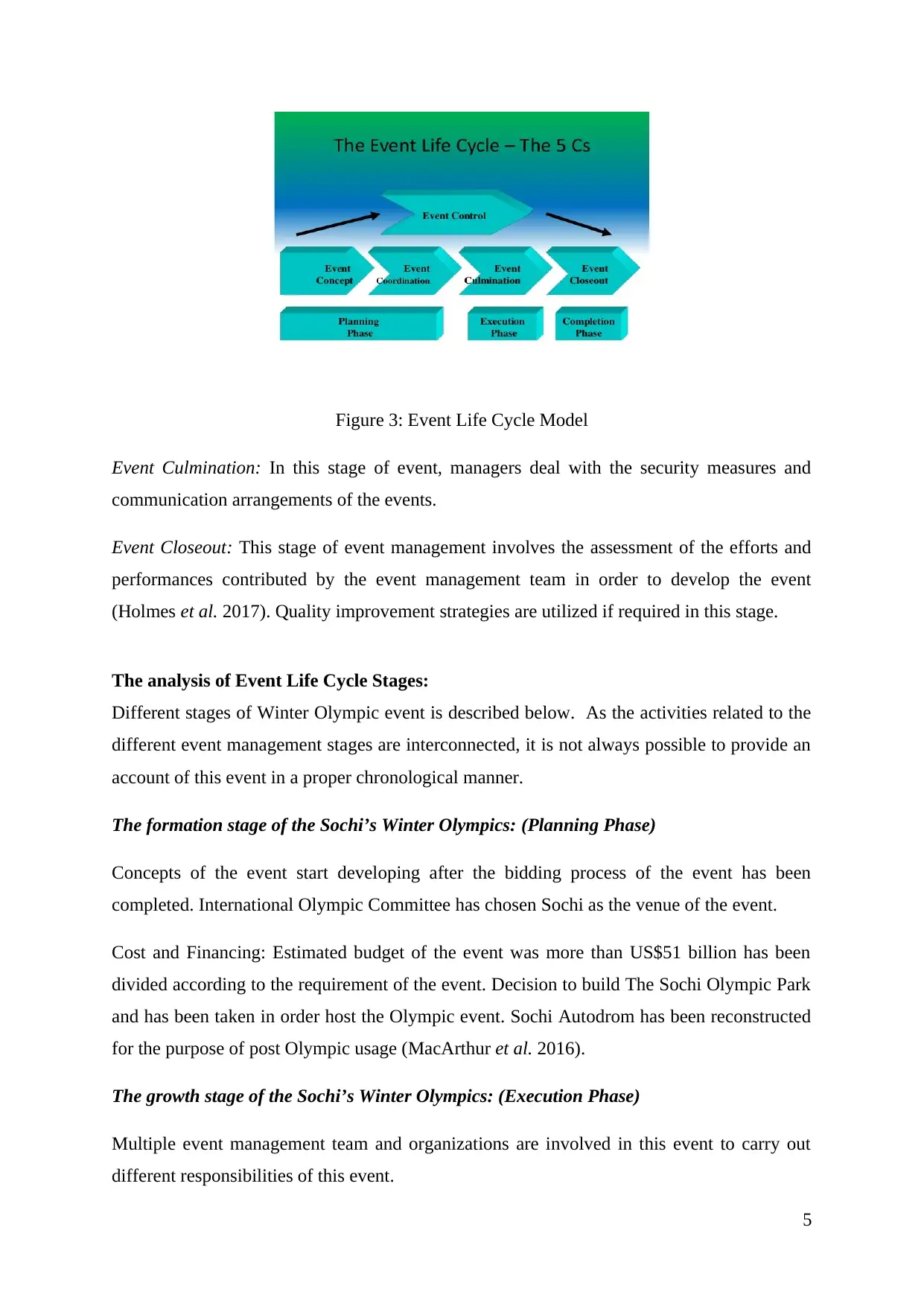
Figure 3: Event Life Cycle Model
Event Culmination: In this stage of event, managers deal with the security measures and
communication arrangements of the events.
Event Closeout: This stage of event management involves the assessment of the efforts and
performances contributed by the event management team in order to develop the event
(Holmes et al. 2017). Quality improvement strategies are utilized if required in this stage.
The analysis of Event Life Cycle Stages:
Different stages of Winter Olympic event is described below. As the activities related to the
different event management stages are interconnected, it is not always possible to provide an
account of this event in a proper chronological manner.
The formation stage of the Sochi’s Winter Olympics: (Planning Phase)
Concepts of the event start developing after the bidding process of the event has been
completed. International Olympic Committee has chosen Sochi as the venue of the event.
Cost and Financing: Estimated budget of the event was more than US$51 billion has been
divided according to the requirement of the event. Decision to build The Sochi Olympic Park
and has been taken in order host the Olympic event. Sochi Autodrom has been reconstructed
for the purpose of post Olympic usage (MacArthur et al. 2016).
The growth stage of the Sochi’s Winter Olympics: (Execution Phase)
Multiple event management team and organizations are involved in this event to carry out
different responsibilities of this event.
5
Event Culmination: In this stage of event, managers deal with the security measures and
communication arrangements of the events.
Event Closeout: This stage of event management involves the assessment of the efforts and
performances contributed by the event management team in order to develop the event
(Holmes et al. 2017). Quality improvement strategies are utilized if required in this stage.
The analysis of Event Life Cycle Stages:
Different stages of Winter Olympic event is described below. As the activities related to the
different event management stages are interconnected, it is not always possible to provide an
account of this event in a proper chronological manner.
The formation stage of the Sochi’s Winter Olympics: (Planning Phase)
Concepts of the event start developing after the bidding process of the event has been
completed. International Olympic Committee has chosen Sochi as the venue of the event.
Cost and Financing: Estimated budget of the event was more than US$51 billion has been
divided according to the requirement of the event. Decision to build The Sochi Olympic Park
and has been taken in order host the Olympic event. Sochi Autodrom has been reconstructed
for the purpose of post Olympic usage (MacArthur et al. 2016).
The growth stage of the Sochi’s Winter Olympics: (Execution Phase)
Multiple event management team and organizations are involved in this event to carry out
different responsibilities of this event.
5
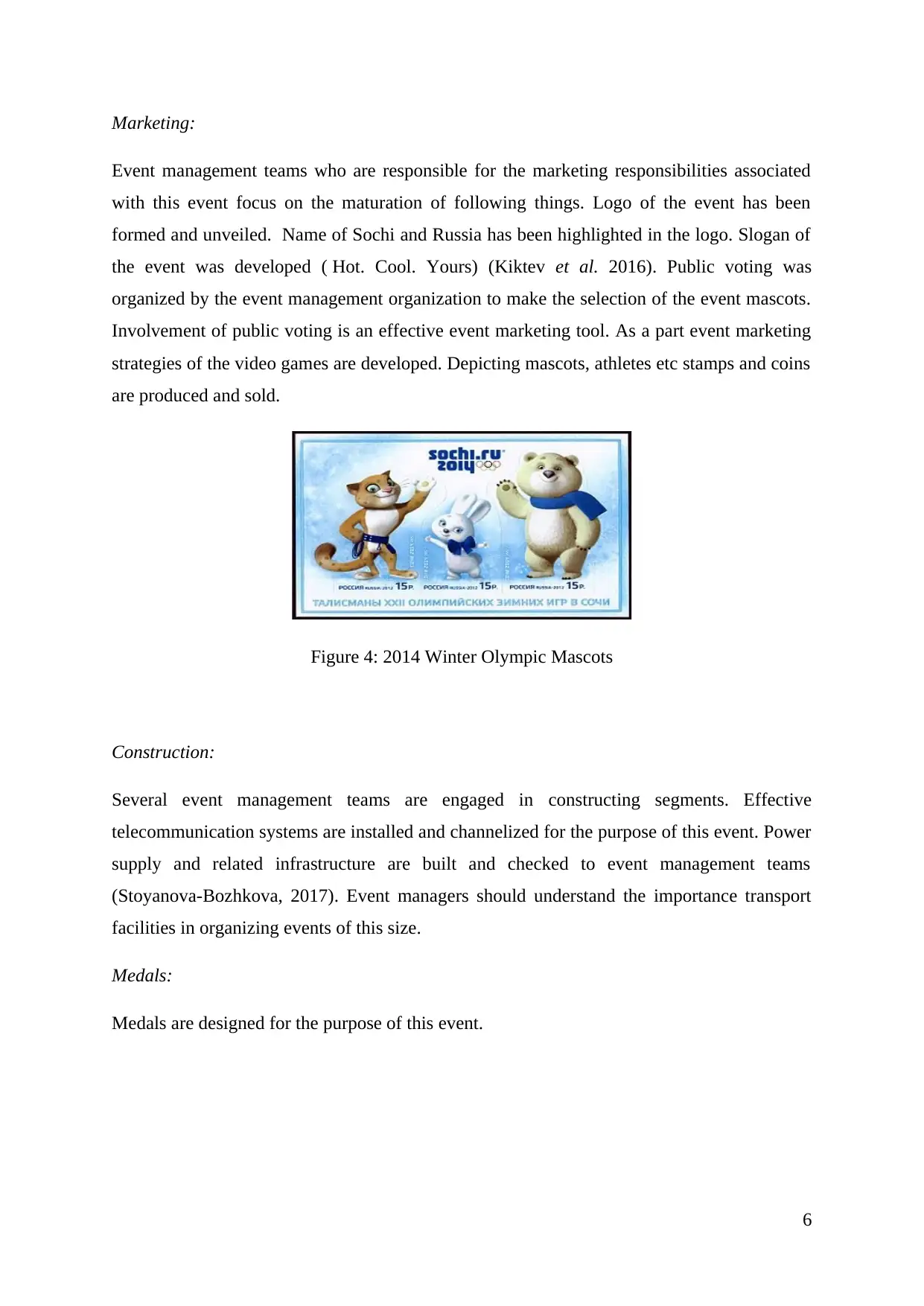
Marketing:
Event management teams who are responsible for the marketing responsibilities associated
with this event focus on the maturation of following things. Logo of the event has been
formed and unveiled. Name of Sochi and Russia has been highlighted in the logo. Slogan of
the event was developed ( Hot. Cool. Yours) (Kiktev et al. 2016). Public voting was
organized by the event management organization to make the selection of the event mascots.
Involvement of public voting is an effective event marketing tool. As a part event marketing
strategies of the video games are developed. Depicting mascots, athletes etc stamps and coins
are produced and sold.
Figure 4: 2014 Winter Olympic Mascots
Construction:
Several event management teams are engaged in constructing segments. Effective
telecommunication systems are installed and channelized for the purpose of this event. Power
supply and related infrastructure are built and checked to event management teams
(Stoyanova-Bozhkova, 2017). Event managers should understand the importance transport
facilities in organizing events of this size.
Medals:
Medals are designed for the purpose of this event.
6
Event management teams who are responsible for the marketing responsibilities associated
with this event focus on the maturation of following things. Logo of the event has been
formed and unveiled. Name of Sochi and Russia has been highlighted in the logo. Slogan of
the event was developed ( Hot. Cool. Yours) (Kiktev et al. 2016). Public voting was
organized by the event management organization to make the selection of the event mascots.
Involvement of public voting is an effective event marketing tool. As a part event marketing
strategies of the video games are developed. Depicting mascots, athletes etc stamps and coins
are produced and sold.
Figure 4: 2014 Winter Olympic Mascots
Construction:
Several event management teams are engaged in constructing segments. Effective
telecommunication systems are installed and channelized for the purpose of this event. Power
supply and related infrastructure are built and checked to event management teams
(Stoyanova-Bozhkova, 2017). Event managers should understand the importance transport
facilities in organizing events of this size.
Medals:
Medals are designed for the purpose of this event.
6
⊘ This is a preview!⊘
Do you want full access?
Subscribe today to unlock all pages.

Trusted by 1+ million students worldwide
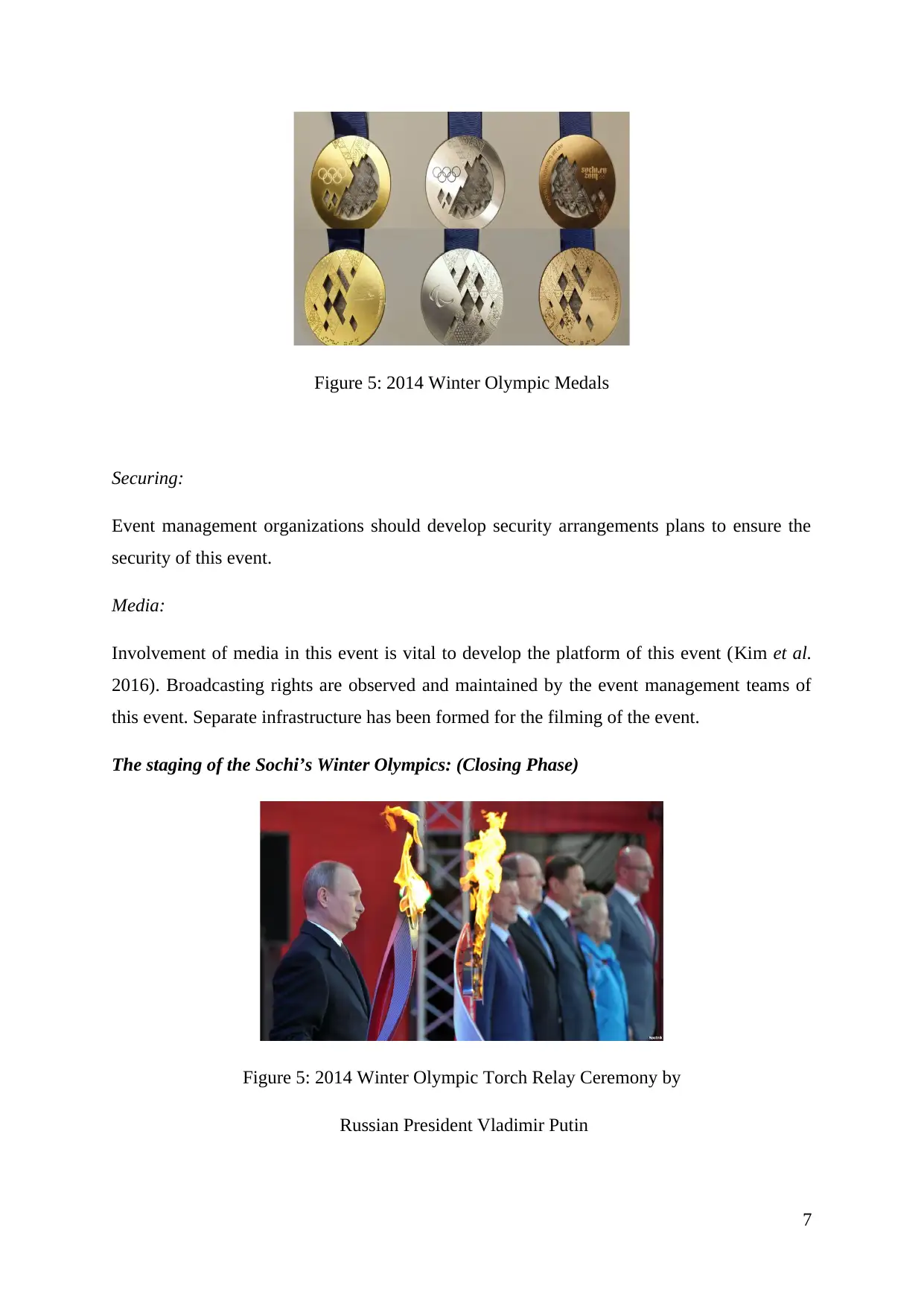
Figure 5: 2014 Winter Olympic Medals
Securing:
Event management organizations should develop security arrangements plans to ensure the
security of this event.
Media:
Involvement of media in this event is vital to develop the platform of this event (Kim et al.
2016). Broadcasting rights are observed and maintained by the event management teams of
this event. Separate infrastructure has been formed for the filming of the event.
The staging of the Sochi’s Winter Olympics: (Closing Phase)
Figure 5: 2014 Winter Olympic Torch Relay Ceremony by
Russian President Vladimir Putin
7
Securing:
Event management organizations should develop security arrangements plans to ensure the
security of this event.
Media:
Involvement of media in this event is vital to develop the platform of this event (Kim et al.
2016). Broadcasting rights are observed and maintained by the event management teams of
this event. Separate infrastructure has been formed for the filming of the event.
The staging of the Sochi’s Winter Olympics: (Closing Phase)
Figure 5: 2014 Winter Olympic Torch Relay Ceremony by
Russian President Vladimir Putin
7
Paraphrase This Document
Need a fresh take? Get an instant paraphrase of this document with our AI Paraphraser
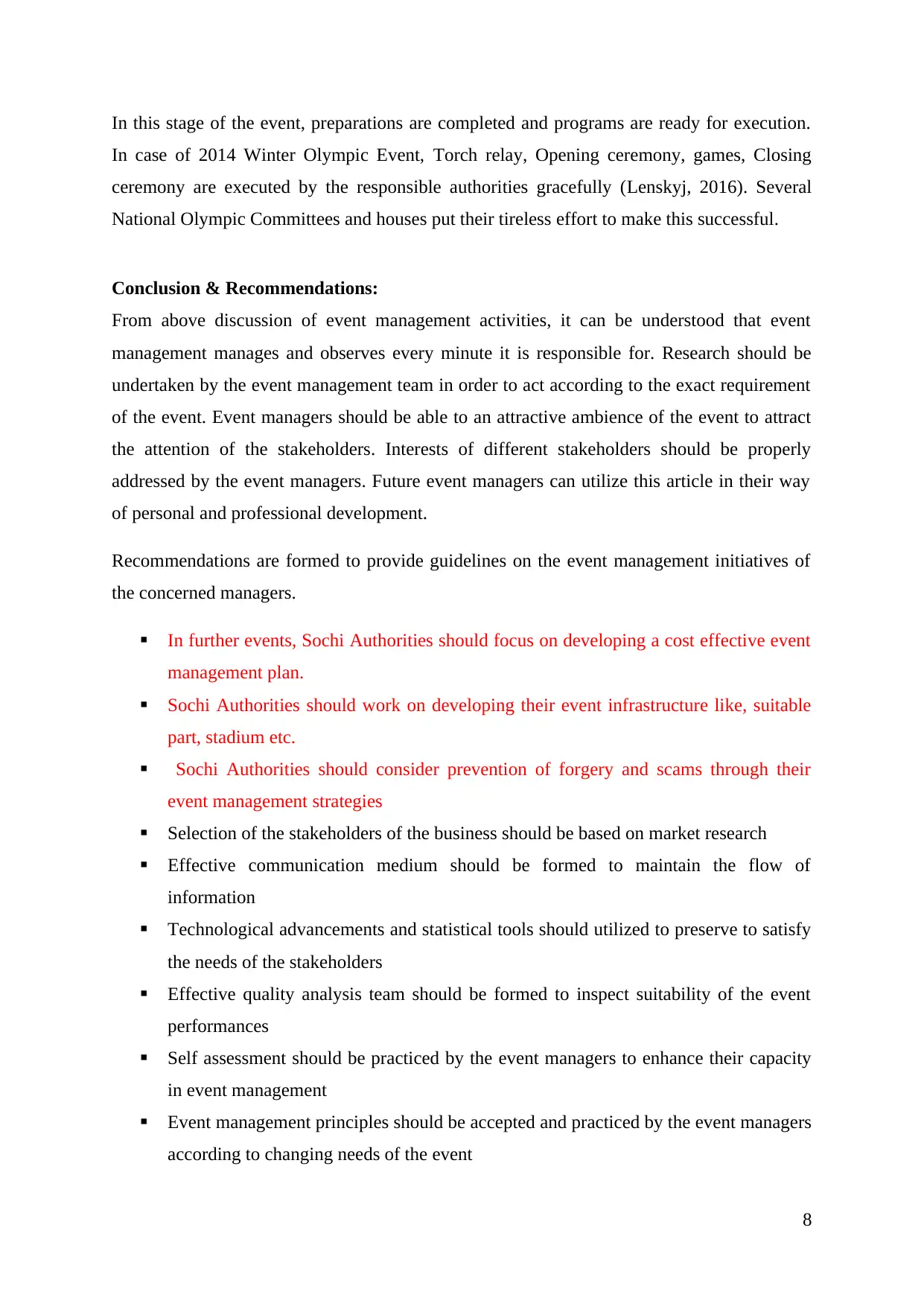
In this stage of the event, preparations are completed and programs are ready for execution.
In case of 2014 Winter Olympic Event, Torch relay, Opening ceremony, games, Closing
ceremony are executed by the responsible authorities gracefully (Lenskyj, 2016). Several
National Olympic Committees and houses put their tireless effort to make this successful.
Conclusion & Recommendations:
From above discussion of event management activities, it can be understood that event
management manages and observes every minute it is responsible for. Research should be
undertaken by the event management team in order to act according to the exact requirement
of the event. Event managers should be able to an attractive ambience of the event to attract
the attention of the stakeholders. Interests of different stakeholders should be properly
addressed by the event managers. Future event managers can utilize this article in their way
of personal and professional development.
Recommendations are formed to provide guidelines on the event management initiatives of
the concerned managers.
In further events, Sochi Authorities should focus on developing a cost effective event
management plan.
Sochi Authorities should work on developing their event infrastructure like, suitable
part, stadium etc.
Sochi Authorities should consider prevention of forgery and scams through their
event management strategies
Selection of the stakeholders of the business should be based on market research
Effective communication medium should be formed to maintain the flow of
information
Technological advancements and statistical tools should utilized to preserve to satisfy
the needs of the stakeholders
Effective quality analysis team should be formed to inspect suitability of the event
performances
Self assessment should be practiced by the event managers to enhance their capacity
in event management
Event management principles should be accepted and practiced by the event managers
according to changing needs of the event
8
In case of 2014 Winter Olympic Event, Torch relay, Opening ceremony, games, Closing
ceremony are executed by the responsible authorities gracefully (Lenskyj, 2016). Several
National Olympic Committees and houses put their tireless effort to make this successful.
Conclusion & Recommendations:
From above discussion of event management activities, it can be understood that event
management manages and observes every minute it is responsible for. Research should be
undertaken by the event management team in order to act according to the exact requirement
of the event. Event managers should be able to an attractive ambience of the event to attract
the attention of the stakeholders. Interests of different stakeholders should be properly
addressed by the event managers. Future event managers can utilize this article in their way
of personal and professional development.
Recommendations are formed to provide guidelines on the event management initiatives of
the concerned managers.
In further events, Sochi Authorities should focus on developing a cost effective event
management plan.
Sochi Authorities should work on developing their event infrastructure like, suitable
part, stadium etc.
Sochi Authorities should consider prevention of forgery and scams through their
event management strategies
Selection of the stakeholders of the business should be based on market research
Effective communication medium should be formed to maintain the flow of
information
Technological advancements and statistical tools should utilized to preserve to satisfy
the needs of the stakeholders
Effective quality analysis team should be formed to inspect suitability of the event
performances
Self assessment should be practiced by the event managers to enhance their capacity
in event management
Event management principles should be accepted and practiced by the event managers
according to changing needs of the event
8

9
⊘ This is a preview!⊘
Do you want full access?
Subscribe today to unlock all pages.

Trusted by 1+ million students worldwide
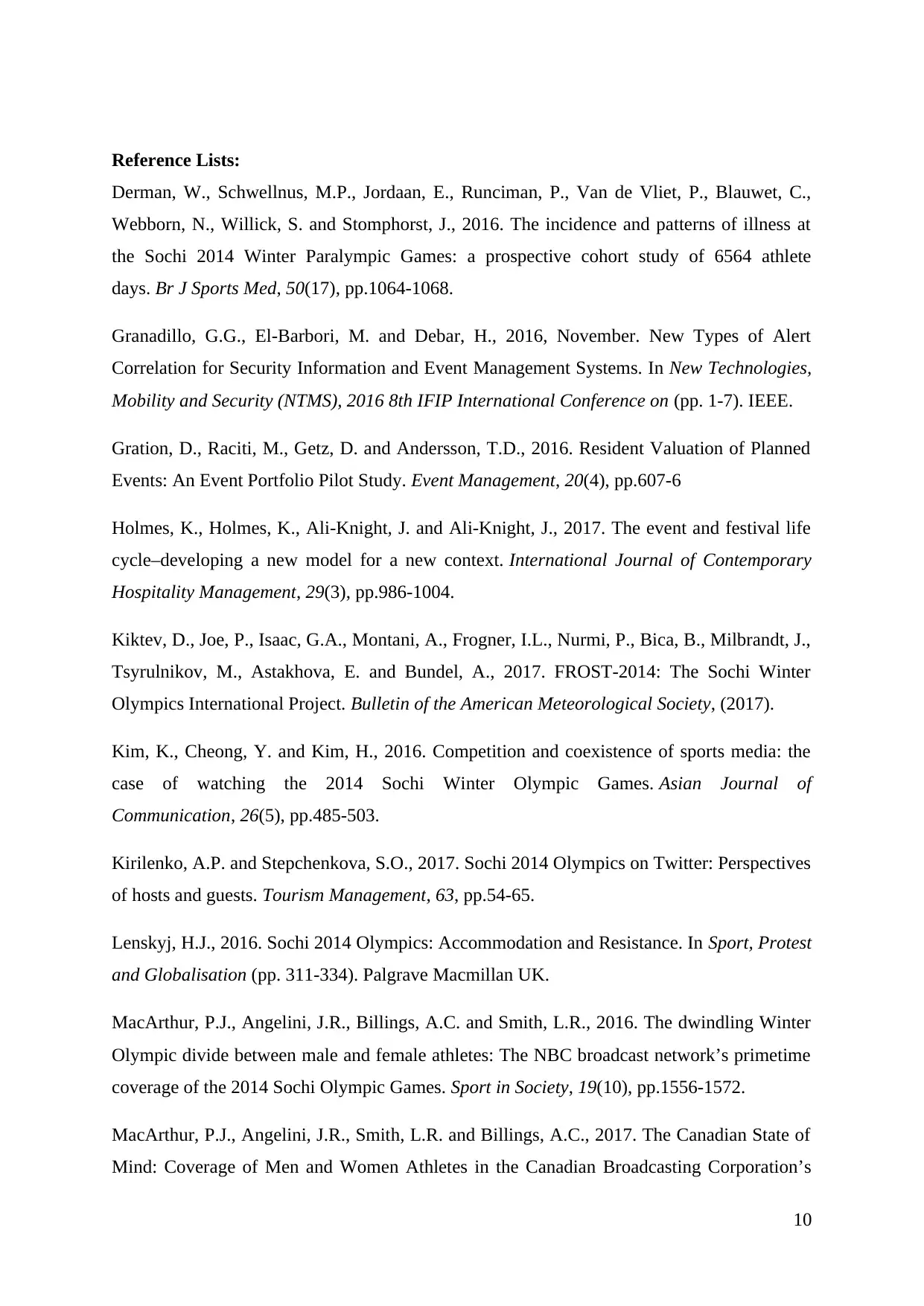
Reference Lists:
Derman, W., Schwellnus, M.P., Jordaan, E., Runciman, P., Van de Vliet, P., Blauwet, C.,
Webborn, N., Willick, S. and Stomphorst, J., 2016. The incidence and patterns of illness at
the Sochi 2014 Winter Paralympic Games: a prospective cohort study of 6564 athlete
days. Br J Sports Med, 50(17), pp.1064-1068.
Granadillo, G.G., El-Barbori, M. and Debar, H., 2016, November. New Types of Alert
Correlation for Security Information and Event Management Systems. In New Technologies,
Mobility and Security (NTMS), 2016 8th IFIP International Conference on (pp. 1-7). IEEE.
Gration, D., Raciti, M., Getz, D. and Andersson, T.D., 2016. Resident Valuation of Planned
Events: An Event Portfolio Pilot Study. Event Management, 20(4), pp.607-6
Holmes, K., Holmes, K., Ali-Knight, J. and Ali-Knight, J., 2017. The event and festival life
cycle–developing a new model for a new context. International Journal of Contemporary
Hospitality Management, 29(3), pp.986-1004.
Kiktev, D., Joe, P., Isaac, G.A., Montani, A., Frogner, I.L., Nurmi, P., Bica, B., Milbrandt, J.,
Tsyrulnikov, M., Astakhova, E. and Bundel, A., 2017. FROST-2014: The Sochi Winter
Olympics International Project. Bulletin of the American Meteorological Society, (2017).
Kim, K., Cheong, Y. and Kim, H., 2016. Competition and coexistence of sports media: the
case of watching the 2014 Sochi Winter Olympic Games. Asian Journal of
Communication, 26(5), pp.485-503.
Kirilenko, A.P. and Stepchenkova, S.O., 2017. Sochi 2014 Olympics on Twitter: Perspectives
of hosts and guests. Tourism Management, 63, pp.54-65.
Lenskyj, H.J., 2016. Sochi 2014 Olympics: Accommodation and Resistance. In Sport, Protest
and Globalisation (pp. 311-334). Palgrave Macmillan UK.
MacArthur, P.J., Angelini, J.R., Billings, A.C. and Smith, L.R., 2016. The dwindling Winter
Olympic divide between male and female athletes: The NBC broadcast network’s primetime
coverage of the 2014 Sochi Olympic Games. Sport in Society, 19(10), pp.1556-1572.
MacArthur, P.J., Angelini, J.R., Smith, L.R. and Billings, A.C., 2017. The Canadian State of
Mind: Coverage of Men and Women Athletes in the Canadian Broadcasting Corporation’s
10
Derman, W., Schwellnus, M.P., Jordaan, E., Runciman, P., Van de Vliet, P., Blauwet, C.,
Webborn, N., Willick, S. and Stomphorst, J., 2016. The incidence and patterns of illness at
the Sochi 2014 Winter Paralympic Games: a prospective cohort study of 6564 athlete
days. Br J Sports Med, 50(17), pp.1064-1068.
Granadillo, G.G., El-Barbori, M. and Debar, H., 2016, November. New Types of Alert
Correlation for Security Information and Event Management Systems. In New Technologies,
Mobility and Security (NTMS), 2016 8th IFIP International Conference on (pp. 1-7). IEEE.
Gration, D., Raciti, M., Getz, D. and Andersson, T.D., 2016. Resident Valuation of Planned
Events: An Event Portfolio Pilot Study. Event Management, 20(4), pp.607-6
Holmes, K., Holmes, K., Ali-Knight, J. and Ali-Knight, J., 2017. The event and festival life
cycle–developing a new model for a new context. International Journal of Contemporary
Hospitality Management, 29(3), pp.986-1004.
Kiktev, D., Joe, P., Isaac, G.A., Montani, A., Frogner, I.L., Nurmi, P., Bica, B., Milbrandt, J.,
Tsyrulnikov, M., Astakhova, E. and Bundel, A., 2017. FROST-2014: The Sochi Winter
Olympics International Project. Bulletin of the American Meteorological Society, (2017).
Kim, K., Cheong, Y. and Kim, H., 2016. Competition and coexistence of sports media: the
case of watching the 2014 Sochi Winter Olympic Games. Asian Journal of
Communication, 26(5), pp.485-503.
Kirilenko, A.P. and Stepchenkova, S.O., 2017. Sochi 2014 Olympics on Twitter: Perspectives
of hosts and guests. Tourism Management, 63, pp.54-65.
Lenskyj, H.J., 2016. Sochi 2014 Olympics: Accommodation and Resistance. In Sport, Protest
and Globalisation (pp. 311-334). Palgrave Macmillan UK.
MacArthur, P.J., Angelini, J.R., Billings, A.C. and Smith, L.R., 2016. The dwindling Winter
Olympic divide between male and female athletes: The NBC broadcast network’s primetime
coverage of the 2014 Sochi Olympic Games. Sport in Society, 19(10), pp.1556-1572.
MacArthur, P.J., Angelini, J.R., Smith, L.R. and Billings, A.C., 2017. The Canadian State of
Mind: Coverage of Men and Women Athletes in the Canadian Broadcasting Corporation’s
10
Paraphrase This Document
Need a fresh take? Get an instant paraphrase of this document with our AI Paraphraser

Prime Time Broadcast of the 2014 Sochi Winter Olympic Games. Journal of Broadcasting &
Electronic Media, 61(2), pp.410-429.
Stoyanova-Bozhkova, S., 2017. Sustainable Event Management: a Practical Guide, M. Jones.
Routledge, Oxon and New York (2014), 394 pp.,(Pbk.),£ 42.99 ISBN 9780415840200,
(Hbk.),£ 100.00 9780415840194,(Ebk),£ 42.99 9780203768723.
Van Niekerk, M. and Getz, D., 2016. The Identification and Differentiation of Festival
Stakeholders. Event Management, 20(3), pp.419-431.
11
Electronic Media, 61(2), pp.410-429.
Stoyanova-Bozhkova, S., 2017. Sustainable Event Management: a Practical Guide, M. Jones.
Routledge, Oxon and New York (2014), 394 pp.,(Pbk.),£ 42.99 ISBN 9780415840200,
(Hbk.),£ 100.00 9780415840194,(Ebk),£ 42.99 9780203768723.
Van Niekerk, M. and Getz, D., 2016. The Identification and Differentiation of Festival
Stakeholders. Event Management, 20(3), pp.419-431.
11
1 out of 11
Related Documents
Your All-in-One AI-Powered Toolkit for Academic Success.
+13062052269
info@desklib.com
Available 24*7 on WhatsApp / Email
![[object Object]](/_next/static/media/star-bottom.7253800d.svg)
Unlock your academic potential
Copyright © 2020–2026 A2Z Services. All Rights Reserved. Developed and managed by ZUCOL.





